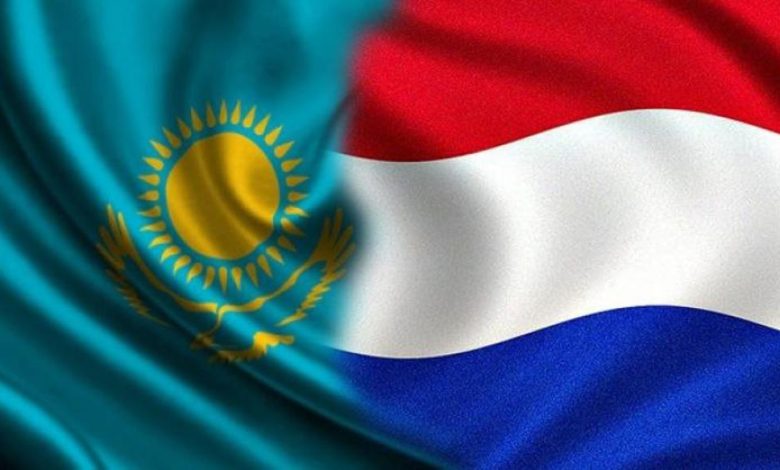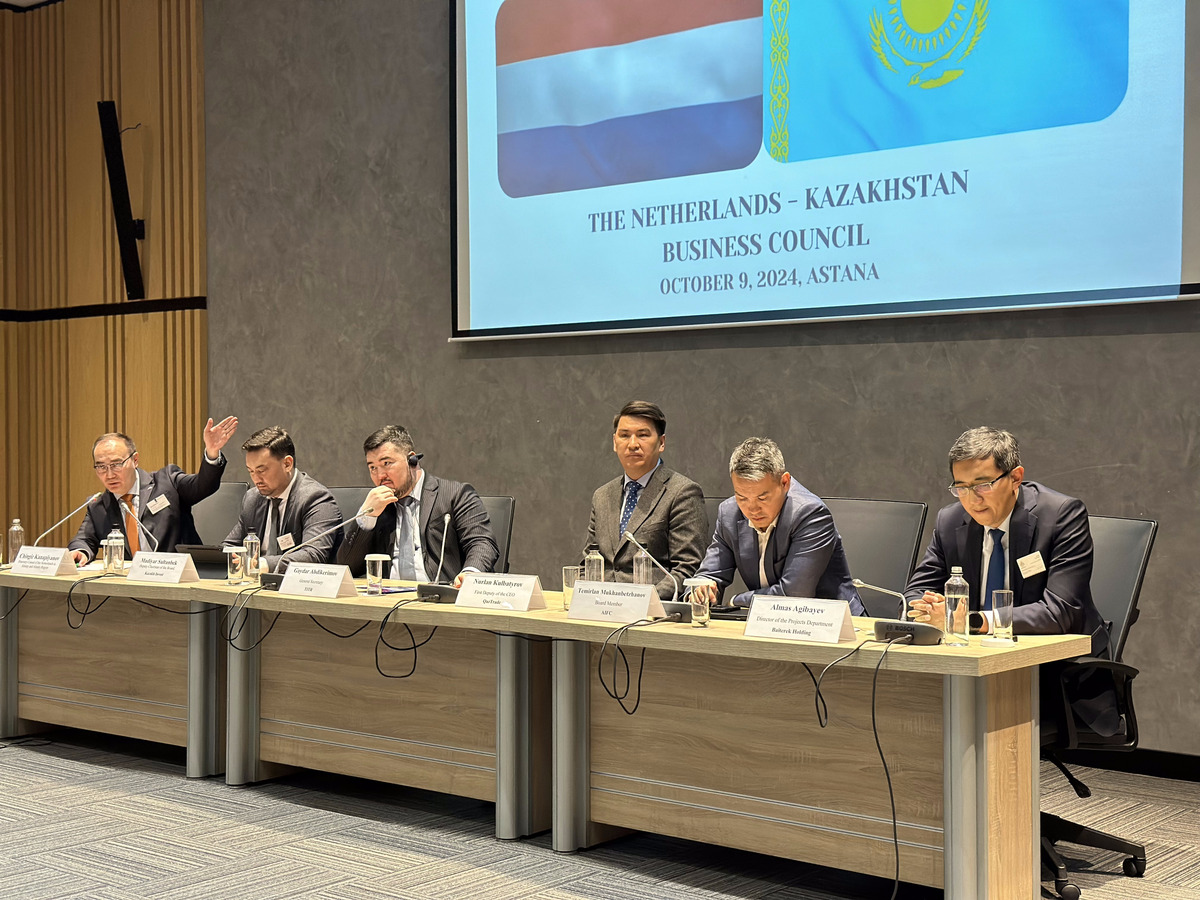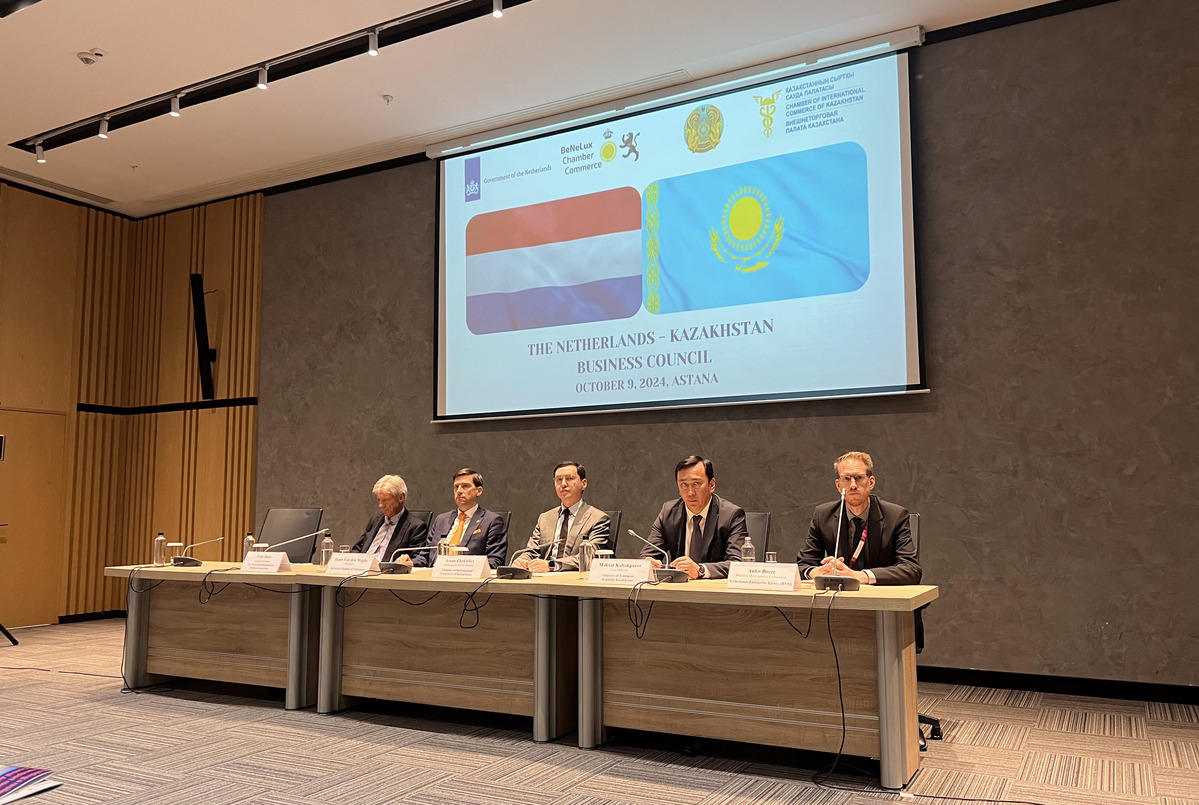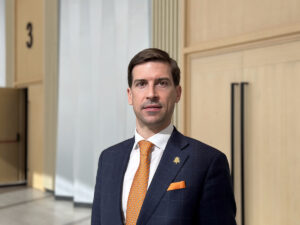Kazakhstan, Netherlands Boost Ties at First Business Council

ASTANA—Kazakhstan and the Netherlands convened the first Kazakh-Dutch Business Council on Oct. 9, focusing on joint efforts to enhance transport, logistics, innovation and green energy cooperation in Astana. The event served as a platform to discuss investment opportunities and the potential of the Trans-Caspian International Transport Route (TITR), also known as the Middle Corridor.

Kazakh-Dutch Business Council on Oct. 9. Photo credit: Nargiz Raimbekova / The Astana Times
“The Netherlands has been a maritime nation for centuries, and we have a big sector in port development. Kazakhstan is working on its own ports in the Caspian Sea to develop the Middle Corridor. There are many opportunities for Kazakh and Dutch companies to work together in this sector,” said Ambassador of the Kingdom of the Netherlands Nicolaas Schermers in his video address to the event’s participants.
Kairat Abdrakhmanov, Ambassador of Kazakhstan to the Kingdom of the Netherlands, also noted in his video address that the event is another testament to the growing and deepening partnership between the two nations.
“We have witnessed a remarkable journey of cooperation, particularly in sectors crucial to our common economic growth. Sustainable development and logistics are the key focus areas with great potential to unlock future opportunities,” said Abdrakhmanov.
Kazakhstan’s vision for transport and logistics
Maksat Kaliakparov, the Kazakh Vice Minister of Transport, emphasized the growing significance of the TITR as a critical international trade route. He noted the ongoing increase in cargo traffic, stating that the country is focusing on creating a modern and efficient transport network through the TITR.
“This business council underlines our common commitment to turning the Trans-Caspian International Transport Route into a modern, multimodal and efficient route with the shortest delivery time,” said Kaliakparov.

From left to right: Gary Hays, Denis Van den Weghe, Assan Zhakishev, Maksat Kaliakparov, Auke Boere. Photo credit: Nagima Abuova / The Astana Times
Kaliakparov added that the seaports of Aktau and Kuryk play a critical role in ensuring the transit of goods through the Caspian Sea, connecting Central Asia with the Caucasus, Türkiye and Europe. These ports also provide access to the Persian Gulf countries through Iran, opening up additional opportunities for trade and cooperation.
“We see great potential for the further development of these ports and are ready to offer Dutch investors opportunities to participate in the modernization and expansion of the port infrastructure,” said Kaliakparov.
He added that at the moment, Kazakhstan is implementing 136 projects worth $21.4 billion in the transport and logistics sector, including modernizing railways, ports and aviation.
“Over the eight months of this year, the volume of cargo transportation along the middle corridor increased by 69% and reached 2.9 million tons. The growth of container traffic on the China – Europe – China route saw an increase of 20 times. By 2030, it is planned to increase traffic volumes to 10 million tons per year, which underlines the important role of Kazakhstan as a key element of transit routes,” said Kaliakparov.
Investment potential and bilateral cooperation
Assan Zhakishev, an acting chairman of the Board of the Foreign Trade Chamber of Kazakhstan, highlighted the Netherlands as one of Kazakhstan’s most prominent investors.
“The Netherlands is not just a major investor but also a key partner in innovative technologies. In 2023, the trade turnover between Kazakhstan and the Netherlands reached $4.4 billion, and the gross inflow of direct investments since 2005 amounted to $117.7 billion,” said Zhakishev.
He also underlined prospects for cooperation in agro-industrial complex and IT technologies and the importance of green projects. “Kazakhstan is actively working to reduce its carbon footprint. Thus partnership with the Netherlands in the development of renewable energy sources is becoming an invaluable contribution.”
Dutch expertise in maritime and agriculture sectors
Denis Van den Weghe, President of the Benelux Chamber of Commerce, emphasized the importance of Dutch companies in developing maritime infrastructure and logistics.

Denis Van den Weghe, President of the Benelux Chamber of Commerce. Photo credit: Nargiz Raimbekova / The Astana Times
“Dutch companies, many of whom are represented here today as part of the trade mission, are global leaders in maritime infrastructure, logistics and port development—industries crucial to Kazakhstan’s growth as a major transport hub. Their expertise aligns perfectly with Kazakhstan’s goals of enhancing its logistics and transport infrastructure to integrate more deeply into global supply chains,” said Van den Weghe.
In an interview with The Astana Times, Van den Weghe explained that the Netherlands-Kazakhstan Business Council was established to bring together businesses and government institutions from both countries. Its purpose is to create a platform where people can exchange ideas, discuss opportunities and collectively address issues, particularly concerning the Middle Corridor initiative.
He also noted that while the initiative is promising, it faces numerous challenges that the expertise from the Netherlands could help tackle. “Rome was not built in a day. This needs to be done step by step, and Dutch expertise can significantly help Kazakhstan achieve its goals,” said Van den Weghe.
Van den Weghe also mentioned the Netherlands’ leadership in agricultural efficiency, highlighting joint ventures between Dutch and Kazakh companies. “The Netherlands has achieved remarkable efficiency in agricultural production and is well-positioned to support Kazakhstan in boosting its agricultural output.”
During the opening session, Van den Weghe announced plans to open a new Chamber of Commerce branch in Aktau, Kazakhstan, and Tashkent, Uzbekistan, to expand their reach into the growing market in Central Asia and better support businesses in the region.
Expanding trade and infrastructure development
The Netherlands Trade Mission on Port Development and Logistics to Kazakhstan is represented by seven companies, including APM Terminals, Boekestijn Transport Service, CF&S Netherlands B.V., Dieseko Group BV, Meever&Meever, Van Oord Dredging&Marine Contractors B.V. and Witteveen+Bos.
“The Netherlands is one of the gateways to Europe and home to the continent’s largest port, Rotterdam. A whole ecosystem of terminal operators, transport providers and infrastructure design companies surround this port. These companies specialize in planning, designing and supplying materials essential for infrastructure development,” told Henk Nieboer, mission leader and Chairman of the Netherlands Kazakhstan Business Association, to The Astana Times.
Nieboer noted that the Netherlands aims to maintain its position as Europe’s logistics hub through the efforts of these companies.
“It is in our national interest to stay connected to the developments in logistics and trade in Kazakhstan. In addition to that, there are commercial interests for individual companies, each of which can contribute to these developments in their own way,” Nieboer said.
The program also featured panel discussions on investment, trade and transit opportunities in Kazakhstan, as well as port development and infrastructure. A signing ceremony for the Business Council’s regulations and meetings between Dutch and Kazakh companies concluded the event.

